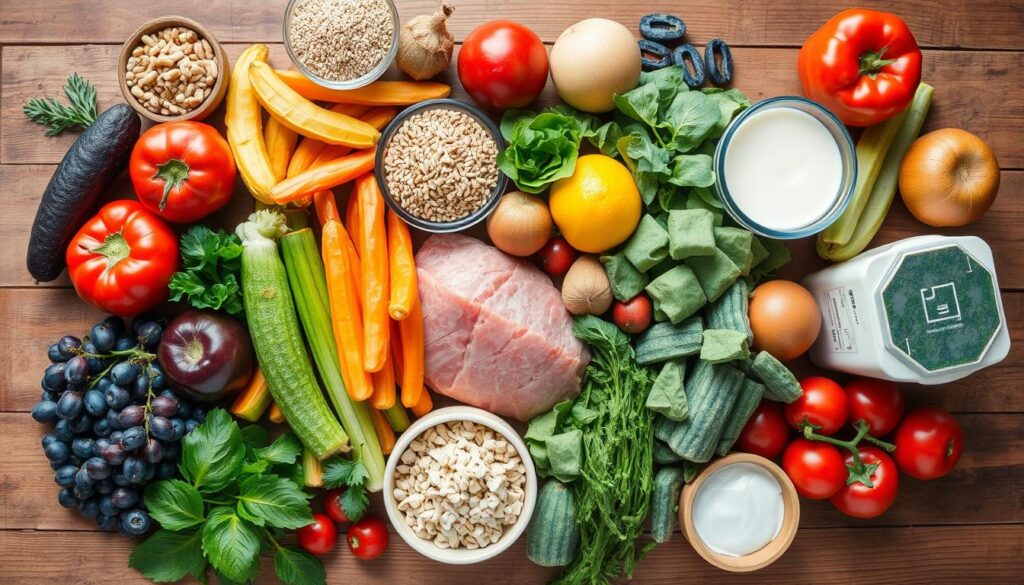Eating a balanced diet is key to staying healthy and feeling great. It means eating a variety of foods in the right amounts. This helps you keep a healthy weight.
The Eatwell Guide suggests eating at least 5 portions of fruits and veggies every day. It also recommends meals based on high-fiber foods like whole grains. Include some dairy or alternatives, beans, pulses, fish, eggs, meat, and other proteins in your diet.
Choose unsaturated oils and spreads in small amounts. Drinking plenty of fluids is also important. But, many in the United States eat too much of certain foods and not enough of others.
Key Takeaways
- A balanced diet is essential for maintaining good health and well-being.
- The Eatwell Guide provides recommendations for a healthy, balanced diet.
- Many Americans consume excessive amounts of calories, saturated fat, sugar, and salt while lacking in fruits, vegetables, and fiber.
- Incorporating a variety of nutrient-dense foods and limiting unhealthy choices are key to a balanced diet.
- Balancing macronutrients and monitoring caloric intake are important for achieving a healthy lifestyle.
Understanding the Fundamentals of Nutrition and Health
Keeping a balanced diet is key for a healthy life. A balanced diet meets all your nutritional needs without too many calories. Adults need 1,600 to 3,000 calories daily, depending on their sex, age, and how active they are.
What Makes a Diet Balanced?
The USDA suggests a healthy eating plate with half fruits and veggies, and the other half grains and protein. Add a low-fat dairy serving. The Healthy Eating Plate from Harvard University focuses on whole grains, healthy protein sources, and plant oils. It also advises against refined grains, red meat, and sugary drinks.
Daily Caloric Needs and Nutritional Requirements
Your caloric intake and nutritional requirements change with age, sex, activity, and health. Talking to healthcare pros, like registered dietitians, is crucial. They help figure out the right macronutrient ratios and calories for your health.
The Role of Macronutrients in Your Diet
Macronutrients are vital for a balanced diet. Carbs give energy, proteins help muscles, and fats are for hormones and brain work. Getting the right mix of these macronutrients ensures your body gets what it needs to work well.
“Dietary diversity supports gut health, maintains a healthy body weight, and protects against chronic disease.”
Essential Food Groups for a Balanced Diet

A balanced diet is key to a healthy life. The 2015-2020 Dietary Guidelines for Americans say a good diet includes foods from five groups: fruits, vegetables, grains, protein, and dairy.
The USDA Food Patterns suggest how much of each food group you should eat. This depends on how many calories you need, from 1,000 to 3,200 a day. It’s also important to limit added sugars, saturated fats, and sodium for health.
Fruits and Vegetables
Fruits and vegetables should be over a third of your daily food. They give you important vitamins, minerals, and fiber. Try to eat at least 5 portions of different fresh, frozen, or canned fruits and vegetables daily, not counting potatoes.
Grains
Grains should be just over a third of your food. Choose whole grains like whole wheat bread, brown rice, and oats. This way, you get the most nutrients.
Protein
Protein-rich foods are vital for muscles. Include lean meats, poultry, eggs, seafood, beans, nuts, and legumes in your diet. Aim for two portions of fish a week, with one being oily fish. But, limit high-mercury fish like swordfish.
Dairy and Dairy Alternatives
Dairy and fortified dairy alternatives are great for protein, vitamins, and calcium. These are good for strong teeth and bones. Opt for low-fat or fat-free options to cut down on saturated fats.
By eating these food groups every day, you’ll get the nutrients your body needs. Drink 6 to 8 glasses of water a day. And, enjoy “discretionary foods” in small amounts.
| Food Group | Recommended Intake | Key Nutrients |
|---|---|---|
| Fruits | 2-4 cups per day | Vitamins, minerals, dietary fiber |
| Vegetables | 2-5 cups per day | Vitamins, minerals, dietary fiber |
| Grains | 4-8 ounces per day | Complex carbohydrates, B vitamins, fiber |
| Protein | 5-7 ounces per day | Amino acids, iron, zinc |
| Dairy | 2-3 cups per day | Calcium, vitamin D, protein |
“Eating a balanced diet is the key to maintaining optimal health and well-being. By incorporating all five food groups, you can ensure your body is getting the nutrients it needs to function at its best.”
Smart Food Choices and Meal Planning

Making smart food choices and planning your meals are key for a balanced diet and healthy lifestyle. Focus on foods rich in nutrients and control your portions. This way, you nourish your body with tasty and fulfilling meals.
Healthy Cooking Methods and Preparation
Choose cooking methods that keep nutrients in your food. Steaming, grilling, or baking are better than deep-frying. They let your food’s natural flavors and health benefits shine.
Meal Timing and Portion Control
Meal timing and portion sizes matter a lot. Don’t skip meals to avoid overeating later. Eat regular, balanced meals all day. Use smaller plates and watch your serving sizes to eat just what you need.
Shopping Tips for Nutritious Foods
When shopping, fill your cart with fresh, whole foods from the store’s edges. Read labels to avoid bad stuff like added sugars and unhealthy fats. Choose foods rich in nutrients like fruits, veggies, whole grains, lean proteins, and healthy fats.
By using these smart food and meal planning tips, you can enjoy a diet full of nutrients. This supports your health and well-being every day.
“The key to a balanced diet is to choose a variety of nutrient-rich foods from all the food groups.”
Common Dietary Mistakes and Foods to Avoid
A balanced diet is key to staying healthy. But, it’s easy to make mistakes that can set you back. Eating too much saturated fat, added sugars, and sodium is a big mistake. These are often found in processed foods, sugary drinks, and fast food.
The U.S. government’s dietary guidelines warn against too much refined grains, red meat, and processed meats. Foods like bacon and sausages can lead to weight gain and heart disease. Instead, choose nutrient-dense whole foods like fruits, vegetables, whole grains, and lean proteins. These foods give you the vitamins, minerals, and fiber you need for good health.
Watch out for hidden sugars in packaged foods and drinks. Choose whole fruits over fruit juices, which have more added sugars and less fiber. Also, drink alcohol in moderation. It can add empty calories and mess up your healthy eating habits.
Also Read : What Are The Types Of Medical Course Available?
FAQs
Q: What is the importance of a balanced diet?
A: The importance of a balanced diet lies in its ability to provide the body the nutrients it needs to function optimally. A well-balanced diet helps reduce the risk of obesity, type 2 diabetes, cardiovascular disease, and other health issues.
Q: How can I build a balanced diet?
A: To build a balanced diet, include a variety of foods that provide essential vitamins and nutrients. Aim for a mix of fresh fruits, vegetables, whole grains, lean proteins, and healthy fats, such as extra virgin olive oil. The USDA’s food pyramid can serve as a helpful guide.
Q: What types of foods should I include for a healthy diet?
A: A healthy diet should include a variety of vegetables, fruits, whole grains, lean proteins (like tofu and fish), and healthy fats. This variety ensures that you get the nutritional value needed for your body’s metabolic processes.
Q: How do carbohydrates fit into a balanced diet?
A: Carbohydrates are an essential part of a balanced diet, providing energy for your body’s activities. Focus on complex carbohydrates, such as whole grains and starches, rather than simple sugars, to maintain stable blood sugar levels.
Q: Can a balanced diet help with weight management?
A: Yes, a balanced diet helps manage weight by providing the right number of calories and nutrients. By following a healthy eating plan that meets your activity level, you can reduce the risk of obesity and maintain a healthy weight.
Q: What are some common misconceptions about a healthy diet?
A: Common misconceptions include the belief that a healthy diet must be restrictive or bland. In reality, a well-balanced diet can include a wide variety of foods, flavors, and textures, allowing for enjoyment while still meeting nutritional needs.
Q: How does physical activity level affect my dietary needs?
A: Your physical activity level directly influences your dietary needs. Active individuals typically need more calories and nutrients to support their energy expenditure, while sedentary individuals may require fewer calories. Adjust your eating plan accordingly.
Q: What are the risks of not following a balanced diet?
A: Not following a balanced diet can lead to several health issues, including obesity, metabolic syndrome, and an increased risk of leading causes of death such as cardiovascular disease and diabetes. It is essential to nourish your body to avoid these risks.
Q: What role do fats play in a healthy diet?
A: Fats are important in a healthy diet as they provide essential fatty acids and help the body absorb fat-soluble vitamins. However, it’s crucial to choose healthy fats, such as those found in avocados and nuts, while limiting saturated and trans fats.
Q: How can I ensure I am getting enough vitamins and minerals?
A: To ensure adequate intake of vitamins and minerals, consume a diverse range of foods from all food groups. Focus on colorful fruits and vegetables, whole grains, lean proteins, and healthy fats to provide the essential nutrients your body needs.
Source Links
- https://www.nhs.uk/live-well/eat-well/how-to-eat-a-balanced-diet/eating-a-balanced-diet/
- https://www.medicalnewstoday.com/articles/324093
- https://nutritionsource.hsph.harvard.edu/healthy-eating-plate/